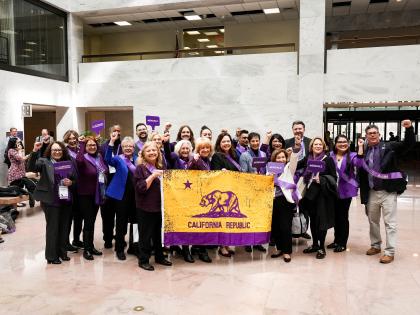California State Alzheimer’s Plan Overview
In 2008, the California Legislature passed Senate Bill 491 calling for the development of a state plan. Under the direction of the California Alzheimer’s Disease and Related Disorders Advisory Committee, established within the California Health and Human Services Agency, a task force was created including representatives from state agencies, community organizations, underrepresented communities, and academia as well as health care providers, caregivers, and individuals living with the dementia. After incorporating public feedback to address California’s culturally diverse population, the task force published California’s State Plan for Alzheimer’s Disease: An Action Plan for 2011-2021.
In 2019, Governor Gavin Newsom appointed a temporary Alzheimer’s Disease Prevention, Preparedness and the Path Forward Task Force as part of the state's Master Plan on Aging, which developed timely recommendations on how California can prevent and prepare for the growing number of Alzheimer’s cases and forge a path forward for families.
California 2026 Policy Priorities

Expand Access to Alzheimer’s Treatments for State-Regulated Insurance Plans
Following the Food and Drug Administration’s (FDA) approval of Alzheimer’s treatments that slow the progression of the disease, state governments have a duty to ensure access to these treatments in Medicaid and other state programs as well as private insurance plans regulated by the state. After requiring treatment coverage in state employee health plans, the Alzheimer’s Association is calling on state lawmakers to pass legislation requiring coverage in state-regulated private insurance plans to continue the progress toward greater access to treatment.

Ensure Access to Care Planning and Cognitive Assessments under Medi-Cal
Early intervention can provide individuals living with dementia more time to plan for the future, adopt early lifestyle changes, participate in clinical trials and attain a higher quality of life for as long as possible. In 2021, SB 48 passed, establishing the Dementia Aware program, which provided free continuing medical education and authorized clinicians to bill Medi-Cal for cognitive assessment and care planning. The Alzheimer’s Association is urging state lawmakers to appropriate $5.4 million to ensure that the Dementia Aware Program can continue to operate for another three years.

Support Victims of Elder Abuse and Exploitation
People with dementia are highly vulnerable to financial exploitation, making them targets for scams, theft or manipulation. Additionally, when exploitation occurs, they may also present as uncooperative, disruptive and combative when they have difficulty communicating and understanding what is happening, which hinders law enforcement’s response. Traditionally, the California District Attorney’s Office prosecutes cases horizontally, with different prosecutors handling each stage of the case. The Alzheimer’s Association is calling on state policymakers to support legislation creating a grant program for vertical prosecution, allowing people living with dementia and their caregivers to work with one prosecuting attorney for an entire case to limit confusion.
California State Advocacy Day
California Alzheimer’s Advocacy Day is your chance to make a real impact. Join us in turning the State Capitol purple as we call on lawmakers to prioritize better care and support for Californians living with Alzheimer’s and other dementias — and for their families. Whether you’re living with a diagnosis, caring for someone, or honoring the memory of a loved one, your voice matters. Come share your story and help drive meaningful change in California.
Sign Up to Learn About Advocacy Opportunities in California

Find My Chapter
Together, we’re making an impact. Find an Alzheimer’s Association chapter in your community for more ways to engage.
Contact Us
State Affairs Contact: Andrew Mendoza
Phone: 916.447.2741
Email: amendoza@alz.org
719,700
people living with Alzheimer’s in California
1,396,000
Californians are providing unpaid care
$5.7 Billion
Medicaid cost of caring for people living with Alzheimer’s (2025)
292.9%
increase in Alzheimer’s deaths 2000-2022
20%
in hospice with a primary diagnosis of dementia
69.8%
increase of geriatricians in California needed to meet the demand in 2050
Resources to Drive Change in California
The following resources developed by AIM and the Alzheimer’s Association will help you learn more about the issues impacting people living with Alzheimer’s and their caregivers, how California policymakers are addressing these gaps, and how you can help drive change.